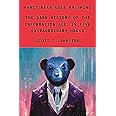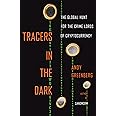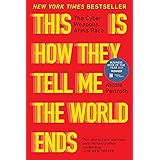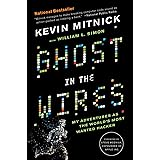
Enjoy fast, free delivery, exclusive deals, and award-winning movies & TV shows with Prime
Try Prime
and start saving today with fast, free delivery
Amazon Prime includes:
Fast, FREE Delivery is available to Prime members. To join, select "Try Amazon Prime and start saving today with Fast, FREE Delivery" below the Add to Cart button.
Amazon Prime members enjoy:- Cardmembers earn 5% Back at Amazon.com with a Prime Credit Card.
- Unlimited Free Two-Day Delivery
- Streaming of thousands of movies and TV shows with limited ads on Prime Video.
- A Kindle book to borrow for free each month - with no due dates
- Listen to over 2 million songs and hundreds of playlists
- Unlimited photo storage with anywhere access
Important: Your credit card will NOT be charged when you start your free trial or if you cancel during the trial period. If you're happy with Amazon Prime, do nothing. At the end of the free trial, your membership will automatically upgrade to a monthly membership.
Buy new:
-45% $16.43$16.43
Ships from: Amazon Sold by: Far Beyond Rubies
Save with Used - Good
$10.53$10.53

Download the free Kindle app and start reading Kindle books instantly on your smartphone, tablet, or computer - no Kindle device required.
Read instantly on your browser with Kindle for Web.
Using your mobile phone camera - scan the code below and download the Kindle app.

OK
 Audible sample Sample
Audible sample Sample 


Fancy Bear Goes Phishing: The Dark History of the Information Age, in Five Extraordinary Hacks Hardcover – May 23, 2023
Purchase options and add-ons
“Unsettling, absolutely riveting, and―for better or worse―necessary reading.” ―Brian Christian, author of Algorithms to Live By and The Alignment Problem
An entertaining account of the philosophy and technology of hacking―and why we all need to understand it.
It’s a signal paradox of our times that we live in an information society but do not know how it works. And without understanding how our information is stored, used, and protected, we are vulnerable to having it exploited. In Fancy Bear Goes Phishing, Scott J. Shapiro draws on his popular Yale University class about hacking to expose the secrets of the digital age. With lucidity and wit, he establishes that cybercrime has less to do with defective programming than with the faulty wiring of our psyches and society. And because hacking is a human-interest story, he tells the fascinating tales of perpetrators, including Robert Morris Jr., the graduate student who accidentally crashed the internet in the 1980s, and the Bulgarian “Dark Avenger,” who invented the first mutating computer-virus engine. We also meet a sixteen-year-old from South Boston who took control of Paris Hilton’s cell phone, the Russian intelligence officers who sought to take control of a US election, and others.
In telling their stories, Shapiro exposes the hackers’ tool kits and gives fresh answers to vital questions: Why is the internet so vulnerable? What can we do in response? Combining the philosophical adventure of Gödel, Escher, Bach with dramatic true-crime narrative, the result is a lively and original account of the future of hacking, espionage, and war, and of how to live in an era of cybercrime.
Includes black-and-white images
- Print length432 pages
- LanguageEnglish
- PublisherFarrar, Straus and Giroux
- Publication dateMay 23, 2023
- Dimensions6.35 x 1.35 x 9.4 inches
- ISBN-100374601178
- ISBN-13978-0374601171
Frequently bought together

Similar items that may deliver to you quickly
From the Publisher
Praise for Fancy Bear Goes Phishing: The Dark History of the Information Age, in Five Extraordinary Hacks by Scott J. Shapiro
|
|
|
|
|---|---|---|
|
|
|
|
Editorial Reviews
Review
"Shapiro is funny and unflaggingly fascinated by his subject, luring even the nonspecialist into technical descriptions of coding by teasing out connections between computer programming and, say, the paradox of Achilles and the tortoise . . . A single paragraph moves nimbly from Putin to Descartes to The Matrix . . . Readers [. . .] will find that their expectations have been entertainingly subverted." ―Jennifer Szalai, The New York Times
"Scott Shapiro is a pretty rare bird―an eminent legal scholar who is also a geek . . . [He] manages to carve a readable path through the conceptual undergrowth . . . [Fancy Bear Goes Phishing is] an impressive achievement . . . [An] absorbing tour of cyberspace’s netherworld." ―John Naughton, The Observer
"[Shapiro] masterfully blends consideration of two sorts of code, software and legal . . . His narrative zips between technical explanations, legal reasoning and the ideas of thinkers including René Descartes and Alan Turing . . . [Shapiro] succeeds in making [hacking] intelligible to non-specialist readers." ―The Economist
“Scott Shapiro’s lively history . . . [uses] vivid case studies to dramatise a technically complex subject . . . His chronological big five hacks are springboards for the stories of pioneers such as . . . John von Neumann . . . or a deft exploration of how virus writers exploit cognitive biases . . . His impish humour and freewheeling erudition suit a world saturated in pop culture . . . All [hackers] have something in common . . . they see it as a game. Shapiro’s achievement is to tell you how it is played.” ―Dorian Lynskey, The Guardian
"Gripping . . . Fancy Bear Goes Phishing offers level-headed suggestions to reduce cybercrime, decrease cyber-espionage and mitigate the risks of cyberwar, arguing that we need to move beyond an obsession with technical fixes and focus instead on the outdated and vulnerable upcode that shapes the shoddy downcode we live with now." ―Richard Lea, The Wall Street Journal
"This scintillating book [. . . ] manages to hack the reader . . . [Fancy Bear Goes Phishing] is a profound work on the idea of technology . . . If you think that books involving discussions of law must be boring, then Shapiro is a good antidote since he is a very humanist and humane writer . . . Erudite, witty, and arch." ―Stuart Kelly, The Scotsman
“Like Virgil guiding Dante through the bowels of a medieval Renaissance Hell, Scott J. Shapiro steers readers of Fancy Bear Goes Phishing through . . . the feral realm of cyberhacking . . . [Readers] will walk away with enhanced insight into our disquieting digital environment . . . a wise book.” ―Howard Schneider, The Progressive
"Ingenious coding, buggy software, and gullibility take the spotlight in this colorful retrospective of hacking . . . Shapiro’s snappy prose manages the extraordinary feat of describing hackers’ intricate coding tactics and the flaws they exploit in a way that is accessible and captivating even to readers who don’t know Python from JavaScript. The result is a fascinating look at the anarchic side of cyberspace." ―Publishers Weekly
“This is an engrossing read . . . An authoritative, disturbing examination of hacking, cybercrime and techno-espionage.” ―Kirkus Reviews
"The question of trust is increasingly central to computing, and in turn to our world at large. Fancy Bear Goes Phishing offers a whirlwind history of cybersecurity and its many open problems that makes for unsettling, absolutely riveting, and―for better or worse―necessary reading." ―Brian Christian, author of Algorithms to Live By and The Alignment Problem
"Fancy Bear Goes Phishing is an essential book about high-tech crime: lively, sometimes funny, readable, and accessible. Shapiro highlights the human side of hacking and computer crime, and the deep relevance of software to our lives." ―Bruce Schneier, author of A Hacker's Mind: How the Powerful Bend Society's Rules and How to Bend them Back
"Scott Shapiro's Fancy Bear Goes Phishing fills a critical hole in cybersecurity history, providing an engaging read that explains just why the internet is as vulnerable as it is. Accessible for regular readers, yet still fun for experts, this delightful book expertly traces the challenge of securing our digital lives and how the optimism of the internet's early pioneers has resulted in an online world today threatened by spies, criminals, and over-eager teen hackers." ―Garrett Graff, co-author of The Dawn of the Code War
About the Author
Product details
- Publisher : Farrar, Straus and Giroux (May 23, 2023)
- Language : English
- Hardcover : 432 pages
- ISBN-10 : 0374601178
- ISBN-13 : 978-0374601171
- Item Weight : 1.4 pounds
- Dimensions : 6.35 x 1.35 x 9.4 inches
- Best Sellers Rank: #71,091 in Books (See Top 100 in Books)
- #19 in Computing Industry History
- #45 in Computer Hacking
- #965 in True Crime (Books)
- Customer Reviews:
About the author

Discover more of the author’s books, see similar authors, read author blogs and more
Customer reviews
Customer Reviews, including Product Star Ratings help customers to learn more about the product and decide whether it is the right product for them.
To calculate the overall star rating and percentage breakdown by star, we don’t use a simple average. Instead, our system considers things like how recent a review is and if the reviewer bought the item on Amazon. It also analyzed reviews to verify trustworthiness.
Learn more how customers reviews work on AmazonReviews with images
-
Top reviews
Top reviews from the United States
There was a problem filtering reviews right now. Please try again later.
_Fancy Bear_ reads as part true crime and part gentle explainer. Along the way, you may discover that things you thought were true are not, that some of your fears were unjustified, and that some aspects of cybersecurity that many, even most, Americans tend to overlook (including, importantly, policymakers) are serious matters to which we need to devote more attention. These go beyond attending to your personal online safety (and if you're not doing that now, you'll probably feel an urgent need to do so after reading this book) to building pressure for legislators, law enforcement, and corporations to make cybersecurity a priority.
The book drives toward Shapiro's discussion in the conclusion and the epilog of how to, and how not to, address the cybersecurity challenges we face. Titled "The Death of Solutionism," Shapiro argues that relying exclusively or primarily on technology to remedy the conditions that allow cybercrime and cyberwar to flourish is doomed to fail due to two principles that are intrinsic to computing itself (what Shapiro calls "the two principles of metacode"): the duality of code and data (that is the capacity for one to function as the other) and the physicality of computation (that is, computing is a physical process subject to the constraints of the physical world). Throughout the book he fleshes out various ways in which these two principles operate, and he brings them to bear (pun half-intended) in discussing the nature of the challenges now facing us.
Does this mean we're doomed? Not by any means. Here Shapiro's attention to the people behind the cyberoffenses he has documented pays off in offering ways forward: in case after case, he demonstrates that the perpetrators of malicious hacks respond to the perverse and not-so-perverse incentives that attend their own situations, from the family stresses, ostracism, and neurodevelopmental challenges faced by adolescent boys to the economic plight of highly-trained technologists in post-Cold-War Eastern Europe. By turning our attention to these conditions, we can stave off many of the future technological threats that might otherwise be realized.
In short, then, Shapiro has given us in Fancy Bear Goes Phishing an urgent, illuminating, entertaining, and above all humane work whose relevance to our lives today cannot be emphasized enough.
I liked the technological stuff explained as simple as possible for a common man to understand
The book gives an understanding of upcode
How cyberwar can change the future
Shapiro, drawing from his popular Yale University class on hacking, masterfully exposes the secrets of the digital age. His lucidity and wit make complex concepts accessible, and his storytelling brings to life the human-interest side of cybercrime. The tales of hackers, from the graduate student who accidentally crashed the internet in the 1980s to the Russian intelligence officers who sought to influence a US election, are as fascinating as they are enlightening.
This book is not just about the technology of hacking, but also about the philosophy behind it. Shapiro argues that cybercrime is less about defective programming and more about the faulty wiring of our psyches and society. This unique perspective makes "Fancy Bear Goes Phishing" a standout in the field of cybersecurity literature.
Shapiro also addresses the vital questions of our time: Why is the internet so vulnerable? What can we do in response? His answers are fresh and thought-provoking, offering valuable insights into the future of hacking, espionage, and warfare in the digital age.
"Fancy Bear Goes Phishing" is a lively and original account that combines the philosophical adventure of "Gödel, Escher, Bach" with dramatic true-crime narrative. It is an essential guide on how to navigate and protect oneself in an era of rampant cybercrime. This book is not just a fascinating read, but a necessary one for our times.
In conclusion, "Fancy Bear Goes Phishing" is a brilliant exploration of the digital world, a book that is as informative as it is entertaining. It is a must-read for anyone who wishes to understand the complexities of our information society and the challenges we face in the digital age.
Top reviews from other countries
The author tries to steer a middle course between, to use his words, the extremes of dull technical detail about computer security and purple prose about how hacking will destroy the world. There is actually a third type of story, hacking as history where the ins and outs of famous hacks are described in detail, such as Sandworm by Andy Greenberg or Worm by Mark Bowden. Those books are meant as entertainment for an audience with a technical background, where a lot of the words, ideas, and methods are known to the reader. This book explains basic ideas and methods so its audience can understand the hack, then gives the hack, then talks about how the hack was allowed by poor code and poor real world procedures so it's hard to see exactly what audience the book is written for.
I loved the stories and the other bits of hacking and computer history, but not the speechifying about how we can and must improve computer security.
Next comes his terrible attempts at explaining technical terms and problems. Not only are most of these utterly broken, they are unnecessary. It reads like he is trying to explain them to himself, and failing. It breaks what little flow the book.
And finally, despite the claims of examing why hacking happens, there is much too much history (most of which could be found out with a quite search if the reader is interested), endless miles of vaguely philosophical waffle, padded out by attempts to show off the authors erudition by quoting ancient philoshopers, and not enough factual information about the perpitrators.
Why 2* and not 1*? Because there are occasional snippets of useful information if you can find them.
















